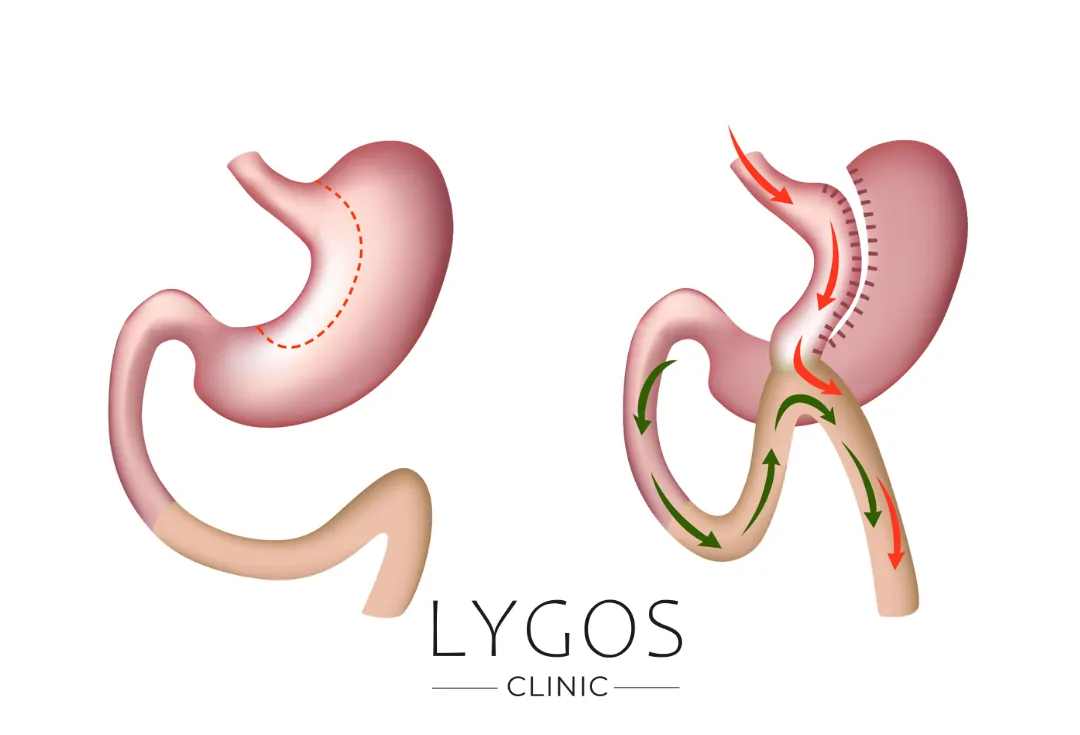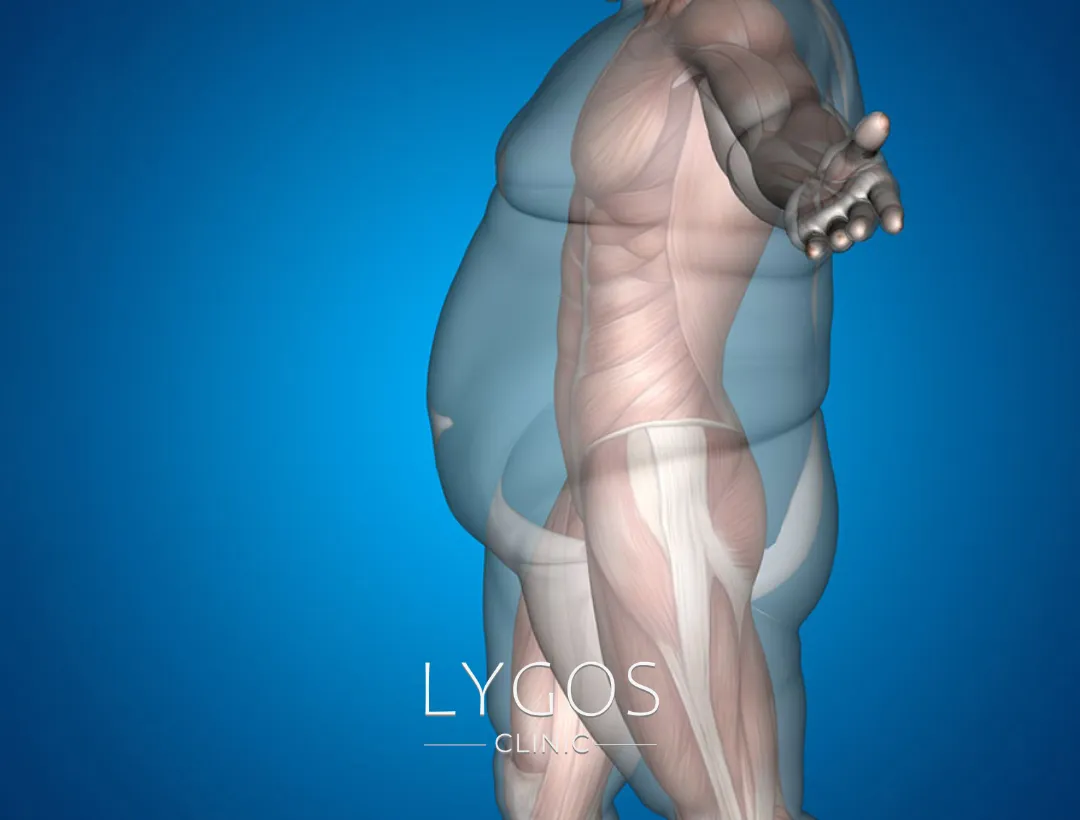Gastric Bypass Surgery
Get Free Consultation
Chose Your Topic

What is Gastric Bypass Surgery?
Gastric bypass surgery is one of the most preferred surgeries in the treatment of obesity. This method provides effective and permanent weight loss by reducing the absorption of nutrients in the small intestine while reducing the volume of the stomach.
In this surgery, the initial part of the stomach is separated from the rest of the stomach, leaving a volume of approximately 30-50 cc. Then, part of the small intestine is bypassed and connected to this newly created small gastric pouch. In this way, patients quickly achieve a feeling of satiety with much smaller portions. At the same time, the absorption of high-calorie foods is largely prevented.
Gastric bypass surgery not only provides patients with a fast feeling of fullness like other volume-restricting surgeries, but also significantly reduces nutrient absorption. This method not only reduces the volume of the stomach, but also bypasses part of the intestines, preventing the body from absorbing a significant portion of the calories taken in.
This surgical method also has the advantage of being reversible if necessary. Patients experience an effective and permanent weight loss in the long term by filling up with small portions thanks to their new pouch with reduced stomach volume. This makes gastric bypass surgery a popular option in the treatment of obesity.
Who is Suitable for Gastric Bypass Surgery?
How is Gastric Bypass Surgery Done?
Before gastric bypass surgery, candidate patients undergo a comprehensive evaluation. In this process, in addition to physical examinations, a detailed examination is performed by endocrinology and psychiatry specialists. Gastric bypass surgery is usually done laparoscopically. In recent years, robotic surgery is also preferred.
The operation is performed through 4-6 holes with a diameter of 1 cm. In this procedure, the stomach is reduced in size, just like in sleeve gastrectomy. Approximately 95% of the stomach is bypassed. With the surgical method, a part of the stomach is divided into two and the 12-finger intestine of this part is bypassed.
After this process is completed, it is connected to the middle of the intestine. The remaining part of the stomach is left in the body and continues to function. In this way, the food consumed is prevented from passing through the duodenum. The purpose of gastric bypass surgery is to ensure that patients are satiated with less food and to prevent the absorption of some of the food they take.
After surgery, patients are kept under observation in the hospital for 4-6 days. After the patient is discharged, the dietitian prepares a nutrition plan for the first follow-up visit. During the first year, patients are closely monitored not only by the bariatric surgeon but also by endocrinology, psychiatry and diet specialists.
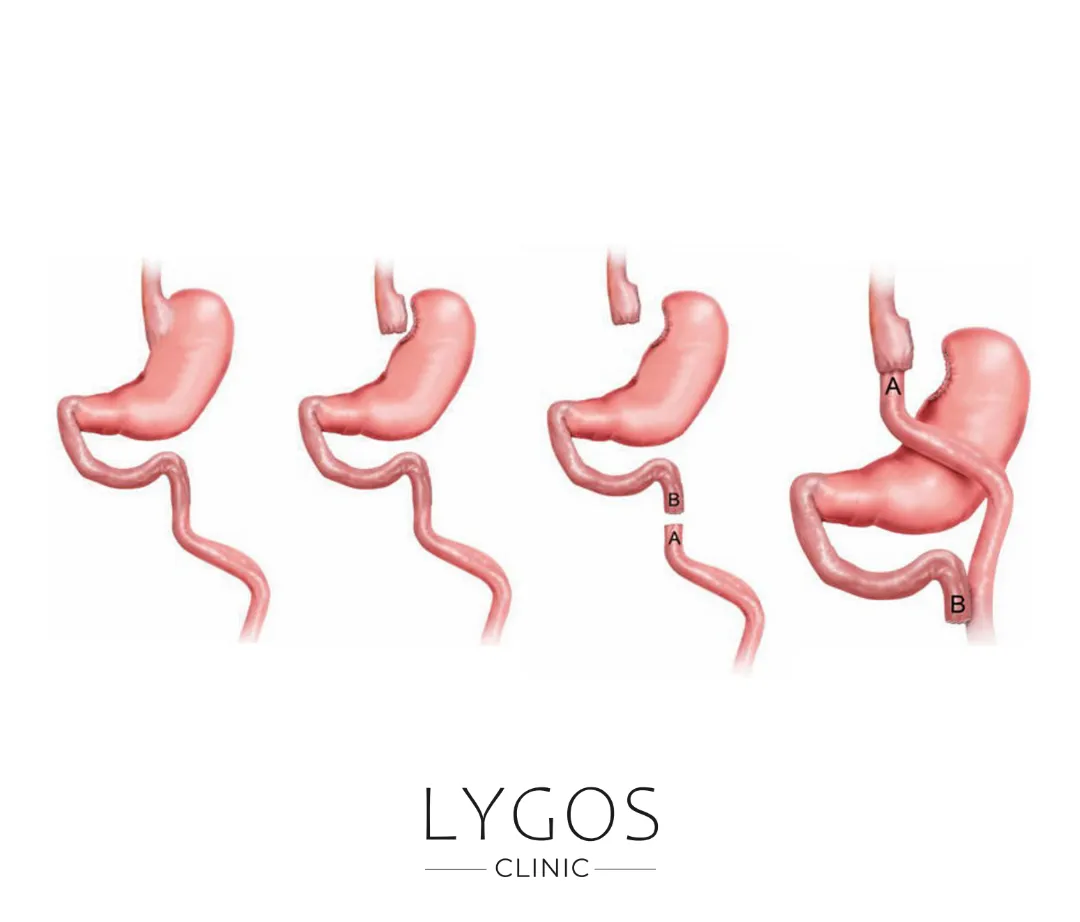
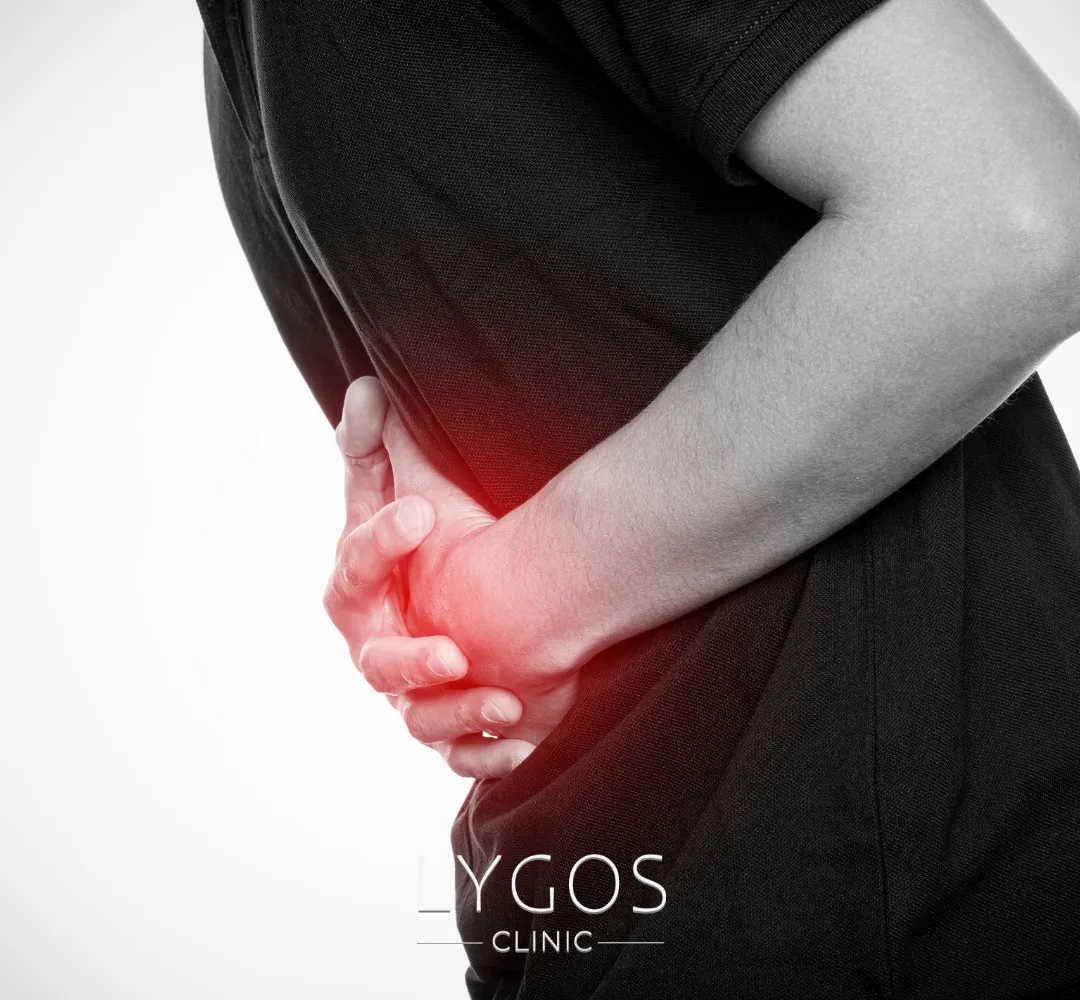
What are the Side Effects of Gastric Bypass Surgery?
This type of surgery is often considered an important step in bariatric surgery. However, gastric bypass surgery involves some side effects. Especially with techniques such as laparoscopic gastric bypass, side effects common to other abdominal surgeries may be encountered. These include bleeding, infection, postoperative intestinal obstruction (ileus), hernia and complications related to general anesthesia.
However, one of the most serious risks is leakage at the junction between the stomach and the small intestine. This may require a second surgical intervention. Additional surgical risks may also be increased due to obesity. For example, blood clots in the feet or lungs (embolism) and heart problems.
Approximately 10-15% of patients undergoing a major operation such as gastric bypass may experience such complications. More serious complications are rare and mostly treatable. A detailed preoperative evaluation and appropriate preparation are important to minimize these risks. Regular follow-up and support in the postoperative period can help in the early diagnosis and treatment of possible complications.
Disadvantages of Gastric Bypass
Gastric bypass disadvantages are rarely seen. This method, which is a highly effective surgical option in the treatment of obesity, has certain disadvantages as with any surgical intervention. Body aches, fatigue, dry skin, hair loss and mood swings that may occur during the post-operative recovery period are usually temporary and resolve over time. These are part of the body’s post-operative adaptation process.
In rare cases, some people who have had gastric bypass surgery may experience more serious problems such as excessive bleeding, infection or blood clots. In particular, a condition called “dumping syndrome” can occur in some people after surgery and is characterized by sudden drops in sugar.
However, it is possible to minimize the disadvantages of gastric bypass surgery performed by experienced doctors in modern hospitals with state-of-the-art equipment. Evaluations and patient follow-ups by specialist doctors help to diagnose potential complications early and manage them effectively.

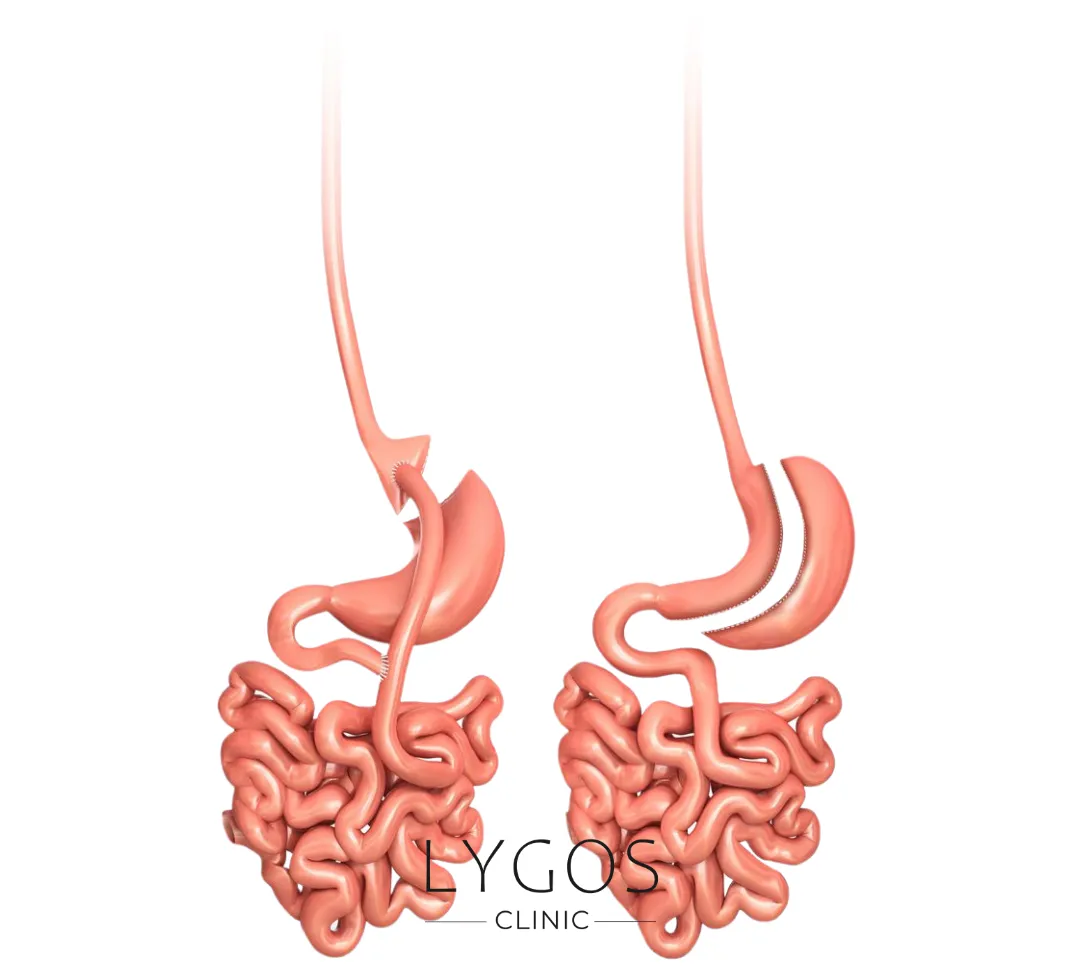
The Difference Between Gastric Bypass and Gastric Sleeve Gastrectomy
Many people are curious about the difference between gastric bypass and sleeve gastrectomy. Gastric sleeve gastrectomy surgery, which has become increasingly popular in obesity surgery in recent years, leads to an increase in this curiosity. In this surgical operation, a large part of the stomach is cut out, leaving a small tubular stomach pouch.
The capacity of this pouch encourages weight loss by allowing the person to consume less food. Sleeve gastrectomy is irreversible, meaning that these changes are permanent. This feature is both an advantage and a factor to be considered for patients. An important point that draws attention after surgery is that the part of the stomach that secretes the hormone ghrelin is also removed.
Ghrelin hormone is known as a hormone that increases appetite; therefore, it is observed that appetite decreases rapidly in patients with sleeve gastrectomy. This helps patients lose weight faster after surgery and adopt new eating habits easily. Gastric bypass surgery is a technically more complex procedure. Here, a small gastric pouch is created from the upper part of the stomach and this pouch is connected further into the small intestine.
Weight loss is also achieved with this method, but it is a more surgically challenging operation. There are risks of reversal with this method. Both methods are important tools in the fight against obesity and related health problems. Which method is appropriate depends on the patient's condition and the surgeon's assessment. Patients who are continuously monitored after surgery and follow the recommendations given by their doctor can achieve successful and permanent weight loss.
Gastric Bypass Surgery
Those who have gastric bypass surgery live a healthier life. Preserving the natural structure of the digestive system also prevents possible problems. At the same time, patients who can perform basic functions comfortably start to live a healthy life. People who get rid of situations that put their health at risk, such as joint pain and difficulty breathing, realize that a different life awaits them.
Apart from the details above, the change experienced after surgery also affects those who have gastric bypass surgery psychologically. Patients who have a fit appearance play a more active role in their social lives as they improve both health and aesthetics.

Nutrition After Gastric Bypass Surgery
1. Adequate and Regular Meals
At least 3 meals should be eaten every day. These meals should include protein, fruits, vegetables and whole wheat cereals in a balanced way. Protein is important for tissue regeneration and healthy body functions.
2. Postoperative Nutrition Stages
Liquid foods should be preferred for the first 2 weeks and pureed foods should be preferred between the 3-4-5th weeks. It is important to facilitate digestion and support healing during this period.
3. Fluid Consumption
Drink at least 1.5-2 liters of water a day to prevent dehydration. Insufficient fluid intake can lead to problems such as headache and weakness. You can also drink alkaline drinks.
4. Soft and easily edible foods
Choose soft and clear foods, such as diet puddings made with low-fat milk, mashed potatoes, cottage cheese. These foods are easy to digest and do not strain the stomach.
5. Avoid simple sugars
Sugary foods should be avoided because such foods can cause sudden blood sugar fluctuations and make weight control difficult.
6. Chewing Food Well
It is important to chew food thoroughly and swallow it after pureeing it. This facilitates digestion and soothes the stomach.
7. Protein Needs
Make sure you get enough protein. Skimmed dairy products such as milk or soy milk are healthy sources of protein and calcium.
8. Separation of Solid and Liquid Foods
It is important not to take solid and liquid foods at the same time. This ensures an early feeling of fullness in the stomach and facilitates digestion.
9. Slow Eating and Satiety
You should eat slowly and try to finish each meal in at least 20 minutes. You should stop eating and drinking when you feel saturation or abdominal pressure.
10. Keep a Food Diary
Keeping a diary of foods consumed and writing down the results can help you develop healthy eating habits.
11. Professional Support
If you regularly experience problems such as vomiting, you should seek professional support. Such problems can negatively affect your health after surgery and may require intervention.

Before and After Gastric Bypass Surgery
The change that occurs before and after gastric bypass surgery manifests itself in many ways. This procedure, which is one of the most ideal methods for the patient, generally does not cause health problems thanks to minimizing the loss of vitamins and minerals. It also preserves the basic functions of the body.
This allows the patient to continue his/her life smoothly before and after gastric bypass surgery. People who have difficulty breathing and have a hard time with joint pain can get rid of their problems thanks to this method. The patient, who turns into a different person before and after gastric bypass surgery, gains a fitter and healthier structure. In this way, it also improves psychologically.
Gastric Bypass Surgery Costs
Gastric bypass surgery costs vary according to the needs of the patient. If the patient’s problem is treated without surgery, the costs are determined accordingly. At the same time, the health problems the person is experiencing can also affect the costs. Gastric bypass surgery costs may increase if the patient undergoes surgery. The cost of surgery performed by a specialist is higher. Therefore, it should be carefully decided which doctor will perform the procedure.
Gastric bypass surgery costs also vary depending on the quality of the hospital. Prices are usually higher in a hospital with high quality and state-of-the-art equipment. However, it should not be forgotten that the success rate will also be reflected in the costs. Therefore, gastric bypass surgery costs can increase with the right choice of hospital and doctor. If you want to get more detailed information on the subject, you can contact Lygos Clinic’s expert team.

Frequently Asked Questions About Gastric Bypass Surgery
BLOG

Is Breathing Through the Mouth Harmful?
Chose Your Topic Is Breathing Through the Mouth Harmful? Breathing is one of the most fundamental needs of life. However,

Does Rice Water Make Hair Grow? | Benefits of Rice Water
Chose Your Topic Does Rice Water Make Hair Grow? Natural methods in hair care have become quite popular in recent

Breast Lump | Types: Benign, Malign and Causes | LYGOS 2025
Breast Lump While cancer stands out as one of the most common health problems today, early diagnosis rates are also


